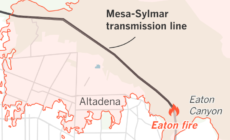-
Australia to Recognize Palestinian Statehood - 8 mins ago
-
Israel Reacts to Australia’s Palestine Move - 23 mins ago
-
What Happened When Mark Zuckerberg Moved In Next Door - 52 mins ago
-
Why Fatal ‘Flesh-Eating’ Bacteria Infections Are On The Rise - 58 mins ago
-
Trump Considers Deploying National Guard Troops to DC - 2 hours ago
-
Trump Raids Help Stir a Political Reversal for Karen Bass - 2 hours ago
-
Israeli-American Council HQ Targeted With Swastika Graffiti: What We Know - 2 hours ago
-
Trump and Putin May Get a Cold Reception From Some Alaskans - 2 hours ago
-
How to Watch LA Galaxy vs Seattle Sounders FC: Live Stream MLS, Start Time, TV Channel - 3 hours ago
-
Commentary: Prepare to say a frond farewell to Los Angeles’ palm trees - 3 hours ago
Opinion | Population Transfers Sanctioned by America? It’s on the Table.
President Trump has introduced a seemingly game-changing, if incendiary, proposal ahead of his meeting on Tuesday with Prime Minister Benjamin Netanyahu of Israel, the first foreign leader he will meet since his inauguration. Three times in less than two weeks, Mr. Trump has suggested that Palestinians could be relocated from Gaza to Egypt and Jordan.
It is hard to exaggerate the traumatic resonance of displacement and population transfer in collective Palestinian memory. This history helps explain the Palestinian determination to remain in the newly devastated territory and the widespread outcry to this relocation proposal and its long-term radicalizing potential.
If the two leaders take this idea seriously in their meeting, and, worse, if the idea comes to fruition, it will almost certainly boost hostility to Israel in the region and kick any prospects of U.S.-sponsored Israeli-Saudi normalization — a goal Mr. Trump enthusiastically seeks to pursue — deep into the long grass. The Saudi leadership recently joined many others in designating Israel’s actions in Gaza a genocide and has become more forceful in conditioning normalizing ties on the creation of a Palestinian state. Aside from being morally reprehensible, a large-scale population transfer of Palestinians would very likely close the door on a three-way U.S.-Israel-Saudi deal for the foreseeable future.
Having put the idea out there, Mr. Trump may think the storm that followed gives him leverage. He may assume that Arab leaders — in classic transactional terms — could give him something in return if he drops it. The idea has a potentially beneficial domestic political angle for Mr. Netanyahu. It holds strong appeal to the right-wing allies that his coalition government depends on and for whom continuing the Nakba — the expulsion and flight of Palestinians around Israel’s creation in 1948 — seems to be an ideological goal. These potential benefits will neither last long nor get them very far.
Mr. Trump’s relocation idea joins a long list of Washington’s illusions about settling the conflict in the Middle East: that Israel is more likely to make peace if treated with indulgence in response to accusations of violations of international law; that resistance to Israeli occupation of Palestinian territories has a military solution; and that normalizing Israel’s relations with Arab states, with which it is not in conflict, can work as an end run around dealing with Palestinian dispossession and denial of self-determination and rights.
In the current environment, suggestions of depopulation, whether intended as a practical proposition or not, cannot be taken lightly. This is not only because of the history of partition and displacement. It is also because of what is happening now. Shortly after the Hamas attack of Oct. 7, as Israel expanded its military operations in Gaza, reports surfaced that the government had floated plans — later downplayed by Mr. Netanyahu — to force Palestinians out of Gaza and into Egypt. Proposals of “voluntary” mass emigration of Palestinians have also been aired in Israeli political circles, including by senior officials.
Following Mr. Trump’s recent comments, Israel’s extreme nationalist finance minister, Bezalel Smotrich, promised to submit an “operational plan” to the government for carrying out the relocation. He and other extremists have repeatedly promoted Israeli-Jewish settlement of Gaza.
These displacement plans do not end with Gaza. The West Bank, where Israel is escalating military operations, is considered by many right-wing extremists in Israel to be the real prize, and Jordan the preferred destination for Palestinians living there.
None of this offers a future of security for Israelis, either. They risk creating an even more destabilized environment for those neighbors being called on to absorb the relocated Palestinians, and the displacements would serve as a rallying cry and recruitment lure for resistance movements across the region.
Of course, Mr. Trump is well known for his bluster, and it is far from clear whether he and Mr. Netanyahu will make this a priority in their meeting. But what if the goal is to actually see this through to implementation? A number of current Trump administration nominees, including Elise Stefanik, to be the ambassador to the United Nations, and Mike Huckabee, to be the ambassador to Israel, openly advocate a greater Israel that belongs to the Jews only. Can it even be done?
Gaza, in many ways, is indeed the demolition site that Mr. Trump has described. Israel’s military campaign has laid waste to 90 percent of the housing stock, most public infrastructure, schools, hospitals, mosques, churches and governmental buildings. If the guns continue to stay silent and Palestinians see no horizon of hope, or even if war resumes, might an atmosphere be created that is more conducive to mass exit? Could the degree of economic aid and military dependence that Jordan and Egypt have on the United States tip the balance?
Probably not. Israel has failed to defeat either Hamas or crush the determination of the Palestinian people. It is hard to find a starker contrast than that between the words uttered by the U.S. president and the resilience of the Palestinian population, as hundreds of thousands have made their way back to northern Gaza in recent days, determined to rebuild their lives.
There is nothing to suggest that Arab states would either fund such an act of displacement or play any role in it, including as recipient countries, despite Mr. Trump’s claim of Egypt and Jordan, “They will do it.” Quite the opposite — all have come out staunchly in opposition, most recently this weekend at a meeting in Cairo of key Arab foreign ministers, who, in a joint statement, rejected “any efforts to encourage the transfer or uprooting of Palestinians from their land, under any circumstances or justifications.”
There is profound contradiction in hearing a president who prides himself on deportations and closing his own borders to migration being so generous in volunteering third countries as recipients of population transfers.
It is even harder to make the case that removing Palestinians should become a policy priority for the U.S. government. After all, what possible core national security interest could it serve? Whatever else there is to say about plans to acquire Greenland or the Panama Canal, America, at least, would be the end beneficiary. Helping to ethnically cleanse Gaza of Palestinians? Not so much. It would only further lacerate America’s standing in the world.
Daniel Levy is the president of the U.S./Middle East Project and served as an Israeli peace negotiator at the Oslo-B talks under Prime Minister Yitzhak Rabin and the Taba negotiations under Prime Minister Ehud Barak.
The Times is committed to publishing a diversity of letters to the editor. We’d like to hear what you think about this or any of our articles. Here are some tips. And here’s our email: letters@nytimes.com.
Follow the New York Times Opinion section on Facebook, Instagram, TikTok, WhatsApp, X and Threads.




















